Introduction
Navigating the confusing world of immigration can feel overwhelming, especially for healthcare workers eager to make their mark in the United States. With staffing shortages in the healthcare sector, understanding the key immigration parole requirements is crucial for those ready to lend their skills. Have you ever felt lost in the immigration process? What specific criteria and documentation do you need to ensure a successful application?
This article dives into the ten essential immigration parole requirements every healthcare worker should know. We’re here to provide you with valuable insights and guidance to help you overcome the barriers you face. Remember, you’re not alone in this fight - we’re in it together.
Vasquez Law Firm: Expert Guidance on Immigration Parole Requirements
Vasquez Law Firm stands ready to tackle the challenges of residency permit criteria, especially for healthcare professionals. Have you ever felt overwhelmed by the complexities of moving to a new country? With over 30 years of dedicated experience, we’ve guided thousands through this intricate legal landscape. Just last year, a significant number of healthcare workers received entry permission, underscoring their vital role in the U.S. labor force. This influx is crucial, particularly as the healthcare sector grapples with ongoing staffing shortages.
Our bilingual team ensures that Spanish-speaking clients receive clear, comprehensive support throughout the process. It’s important to know that entry permission remains a key pathway for healthcare professionals eager to share their expertise in the U.S. Our commitment to personalized service and expert legal advice has made us a trusted ally for those navigating these essential residency processes.
Authorities in residency law stress that understanding the immigration parole requirements is vital for healthcare workers. Successful cases show that with the right documentation and legal support, many have overcome barriers to entry, allowing them to step into critical roles within the healthcare system. We’re here to support healthcare workers in achieving their residency goals, so they can focus on their essential work in the community.
Your future matters to us. Let’s fight together for your right to serve where you’re needed most.
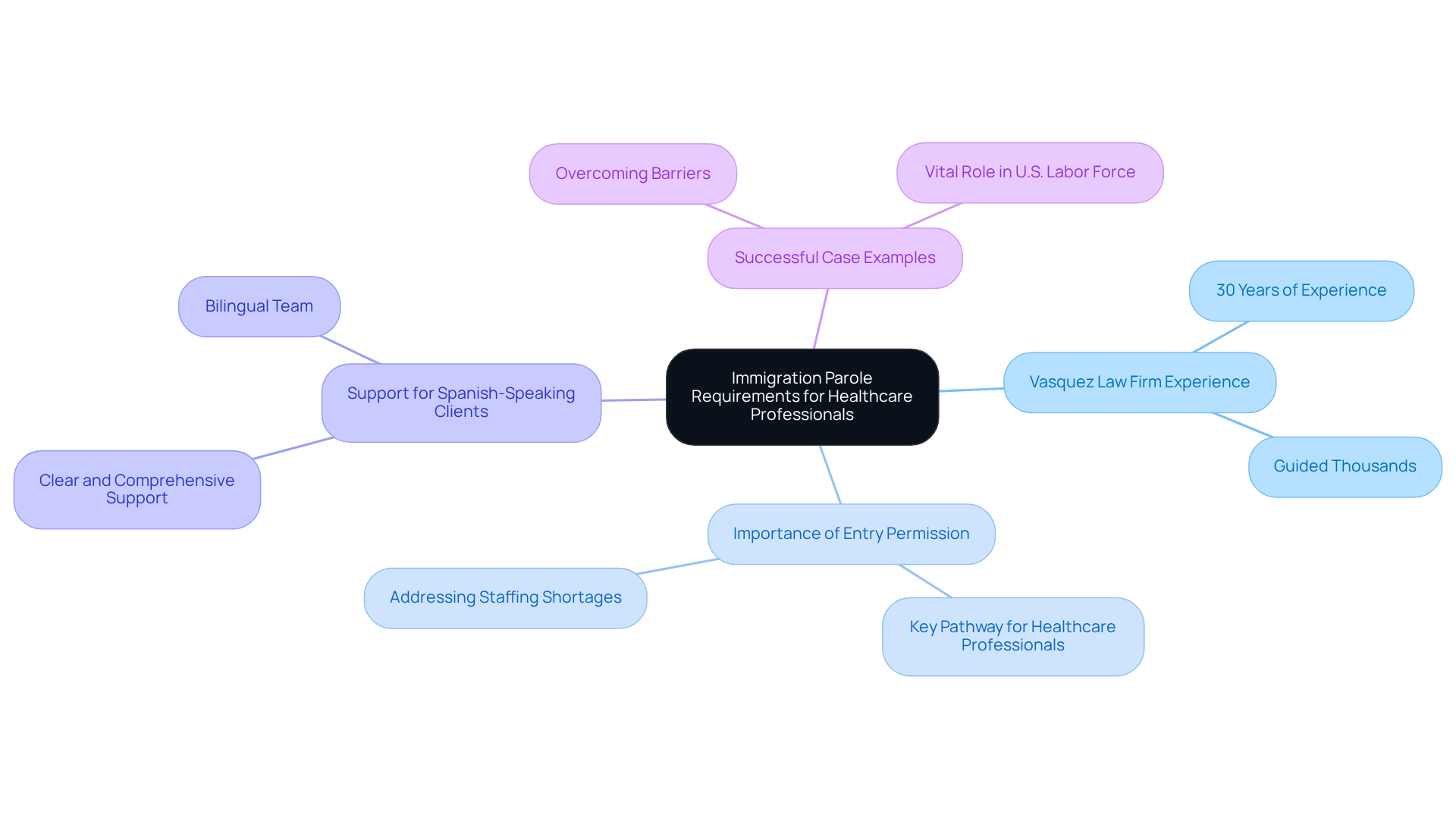
Understanding Immigration Parole: Definition and Purpose
Immigration parole requirements are a crucial option for many non-citizens facing urgent humanitarian challenges. It allows temporary entry or stay in the United States, but it’s not the same as formal admission. This legal pathway can be a lifeline for those who meet the immigration parole requirements and might otherwise be turned away.
Have you ever felt overwhelmed by the immigration process? In times of crisis, like ICE enforcement actions or deportation proceedings, knowing your rights is essential. You have the right to:
- Remain silent
- Consult with an attorney
- Choose not to sign any documents without legal guidance
If ICE comes knocking, don’t open your door unless they have a warrant signed by a judge. Remember, it’s your right to stay silent and ask for an attorney right away.
For urgent legal help, reach out to professionals who understand your situation and can protect your rights. We’re here to fight for your family and ensure you don’t have to navigate this alone. Your future matters to us - let’s take the next step together.
Eligibility Criteria for Immigration Parole: Who Can Apply?
Applicants must demonstrate urgent humanitarian needs or significant public benefit to meet the immigration parole requirements for release. This includes individuals facing medical emergencies, victims of violence, or those wanting to reunite with family in the U.S. For healthcare workers, criteria can involve urgent job opportunities in critical care settings or situations where their expertise is vital to address public health crises.
Have you noticed the recent trend? Many healthcare workers from countries in conflict or economic turmoil are seeking temporary relief, highlighting the growing demand for skilled labor in the U.S. Immigration law experts emphasize that applicants need to clearly express their situations. The approval process considers the urgency of their needs and the potential distress if relief isn’t granted.
In emergencies, it’s crucial to know your rights: you have the right to remain silent and the right to an attorney. If you encounter legal challenges, like ICE enforcement actions or deportation proceedings, don’t hesitate to reach out to Vasquez Law Firm for immediate assistance.
This understanding of immigration parole requirements is essential for healthcare professionals navigating the complexities of entry release. Vasquez Law Firm offers free consultations and 24/7 emergency support for those in need. Remember, we’re here to fight for your family and your future matters to us. Yo Peleo - We Fight.
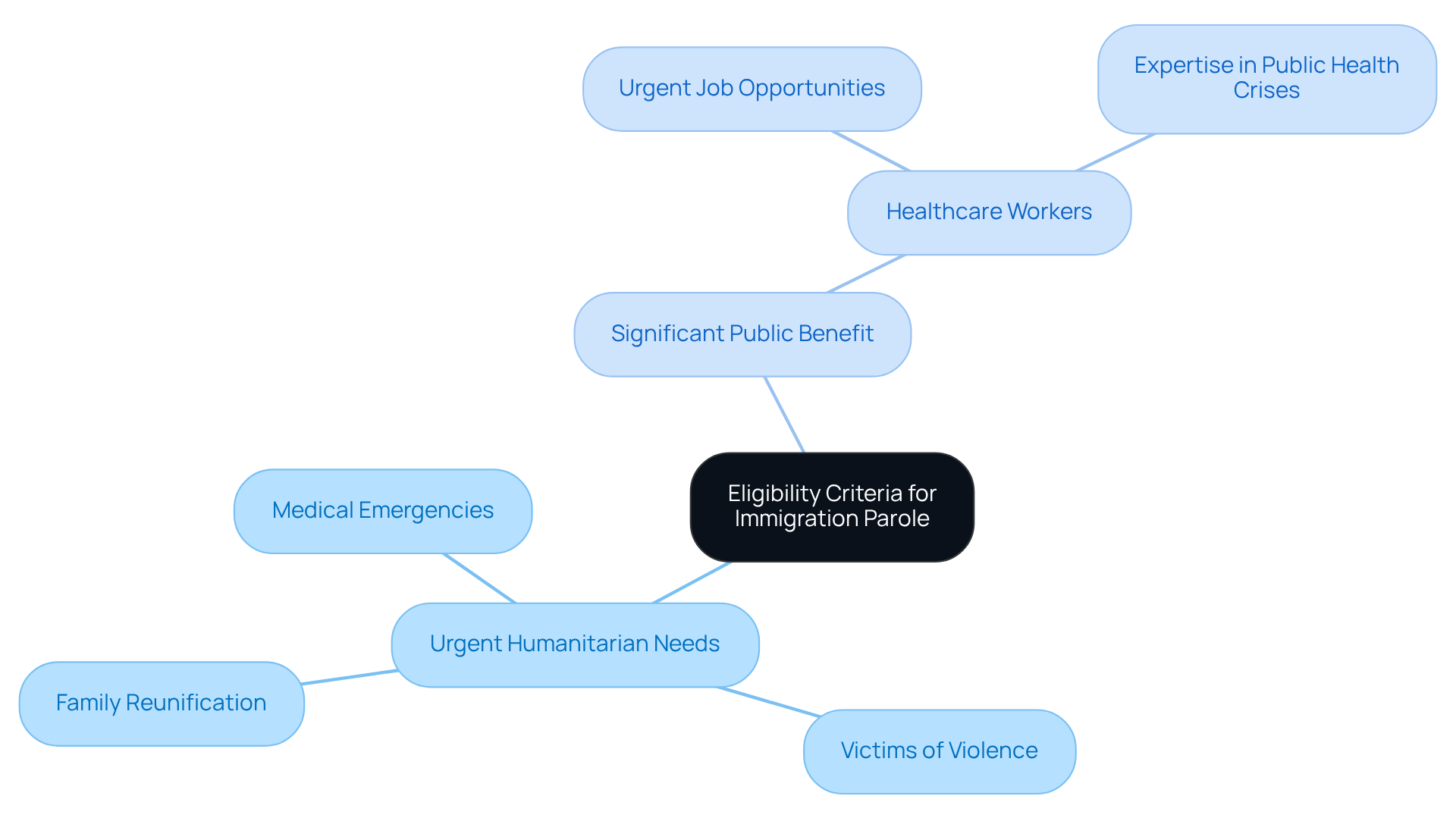
Required Documentation for Immigration Parole Applications
When applying for immigration permission, it’s crucial to understand the immigration parole requirements and the essential documents needed to support your case. Here’s what you’ll need:
- Form I-131, Application for Travel Document: This is your primary form to request parole.
- Evidence of Urgent Humanitarian Need or Significant Public Benefit: Clearly demonstrate the reasons for your request. This could be a medical emergency or another compelling circumstance.
- Supporting Documents: Include medical records, police reports, or affidavits from U.S. sponsors that validate your request for release.
- Proof of Identity: A valid passport or government-issued ID is necessary to verify who you are.
- Additional Documentation: Any other relevant documents that strengthen your case for parole should also be included.
It is essential to understand the immigration parole requirements. Incomplete submissions can lead to delays or even rejections. Common reasons for denial often stem from insufficient evidence of humanitarian need or failure to provide required documentation. Immigration attorneys emphasize the importance of thorough documentation to fulfill immigration parole requirements and enhance your chances of a successful application. Remember, you’re not alone in this fight-we’re here to support you every step of the way.
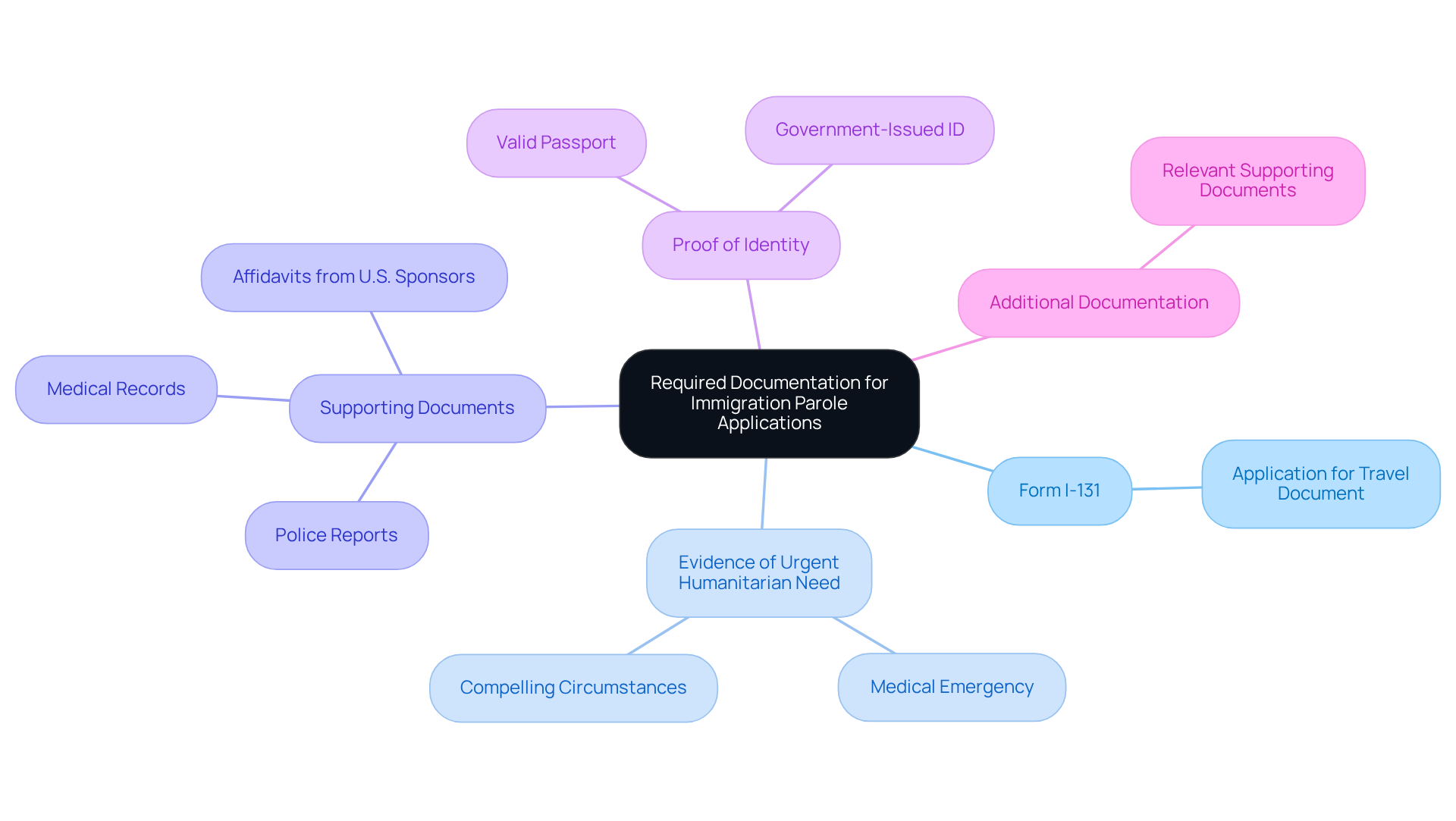
Step-by-Step Process for Applying for Immigration Parole
Navigating the immigration parole requirements can feel overwhelming, but you’re not alone in this fight. Here’s a straightforward guide to help you navigate the process:
- Determine Eligibility: Start by evaluating your situation. Do your circumstances align with humanitarian needs or substantial public advantage? These are the main reasons for release.
- Gather Required Documentation: Collect all necessary documents, including Form I-131 and any supporting evidence that backs up your claims. This might include medical records, police reports, or letters from professionals who can vouch for your situation.
- Complete and Submit the Request: Fill out the request forms accurately and submit them to USCIS. Make sure all required documentation is included to avoid delays. Remember, USCIS only accepts electronic payments for filing fees, and the new fee for conditional release is $1,000.
- Await USCIS Decision: Processing times for immigration requests can vary, typically ranging from 60 to 120 days. This depends on the complexity of your case and the current workload at USCIS. Be prepared for potential delays due to the high volume of requests.
- Follow Requirements: If your request is accepted, it’s crucial to comply with any stipulations outlined in the release approval. It is important to understand that immigration parole requirements state that parole is temporary, and you must leave the U.S. before the expiration date unless you apply for re-parole.
To boost your chances of a successful submission, consider scheduling a complimentary consultation with Vasquez Law Firm. Just fill out the contact form on our website with your name, email, phone number, and details about your case. Our experienced lawyers specialize in visa regulations and can provide tailored legal representation to fit your unique circumstances. As one legal expert wisely noted, "The request must be backed by persuasive proof to illustrate the urgency of your circumstances." If your request is denied, remember you can appeal within 33 days. Consulting with a knowledgeable lawyer specializing in immigration matters can significantly enhance your chances of a successful application.
We’re here to fight for your family. Your future matters to us. Yo Peleo - We Fight.
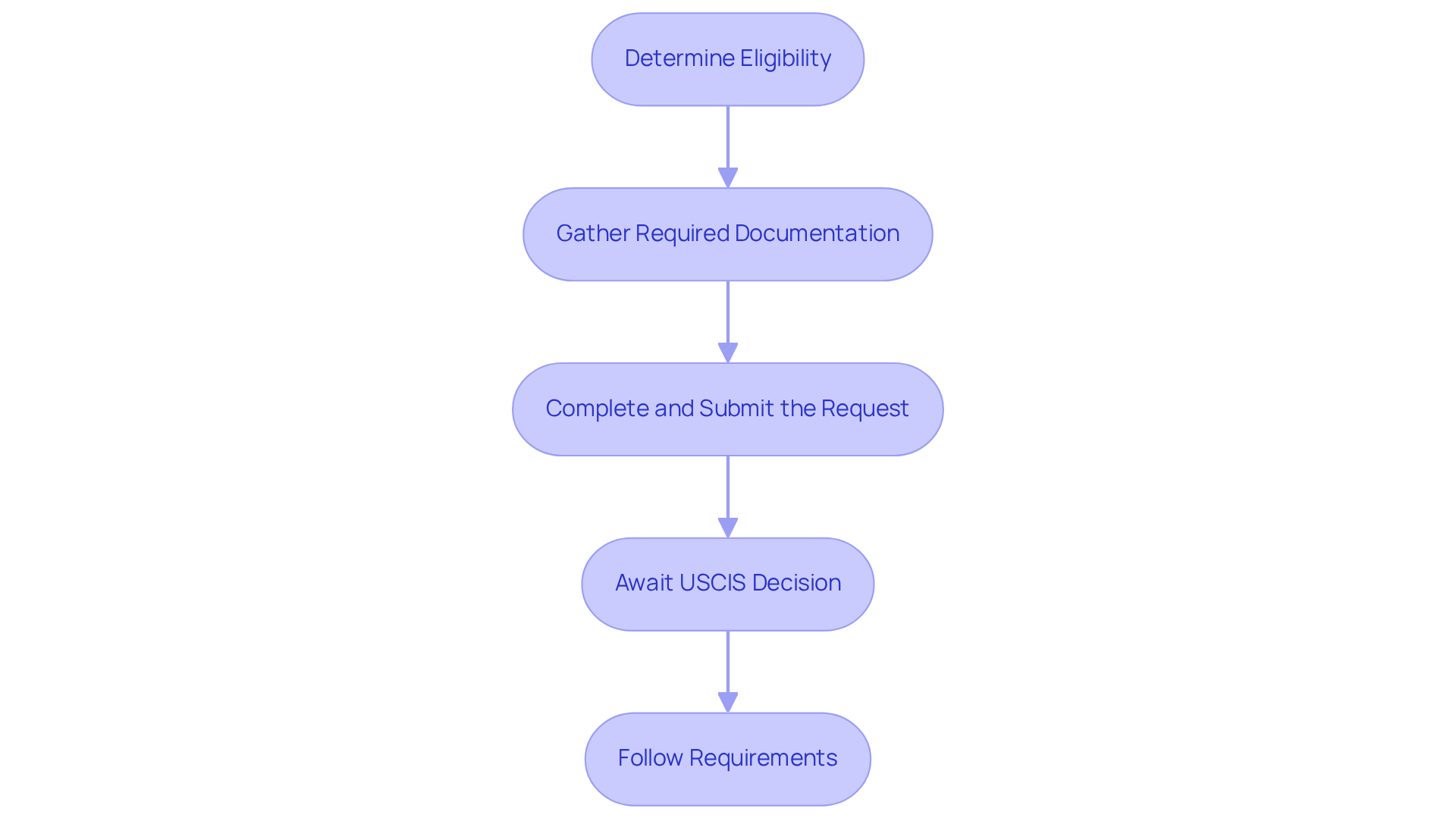
Sponsor Requirements for Immigration Parole Applications
A backer for residency release must be a U.S. citizen or lawful permanent resident willing to provide financial assistance to the individual granted such status. This commitment is formalized through the completion of Form I-134, the Affidavit of Support, which demonstrates the sponsor's financial capability to meet the immigration parole requirements for the parolee. This is crucial to prevent the parolee from becoming a public burden, a condition that could jeopardize their residency process.
Have you ever felt overwhelmed by the immigration process? Recent data shows that many sponsors are stepping up, actively completing Form I-134 for various parole programs. For instance, in the Haitian Family Reunification Parole Program, 10,534 requests were accepted from the invitations issued. This highlights the critical role of sponsors in facilitating these transitions.
Experts emphasize that completing Form I-134 is not just a formality; it’s a serious commitment to the financial well-being of the parolee. U.S. consular officials often request this form during temporary visa applications, underscoring its importance in the broader residency framework. Additionally, the immigration parole requirements stipulate that sponsors must have an income greater than 100 percent of the federal poverty guidelines, which is essential for understanding the financial commitment involved.
Successful residency sponsorship cases frequently showcase sponsors who have effectively navigated the complexities of the process. Their financial support not only meets the immediate needs of the parolee but also aids in smoother integration into U.S. society, paving the way for potential pathways to permanent residency. It’s important to note that while Form I-134 signifies a commitment, it does not legally bind the sponsor to a long-term financial obligation.
We’re here to fight for your family. Your future matters to us.
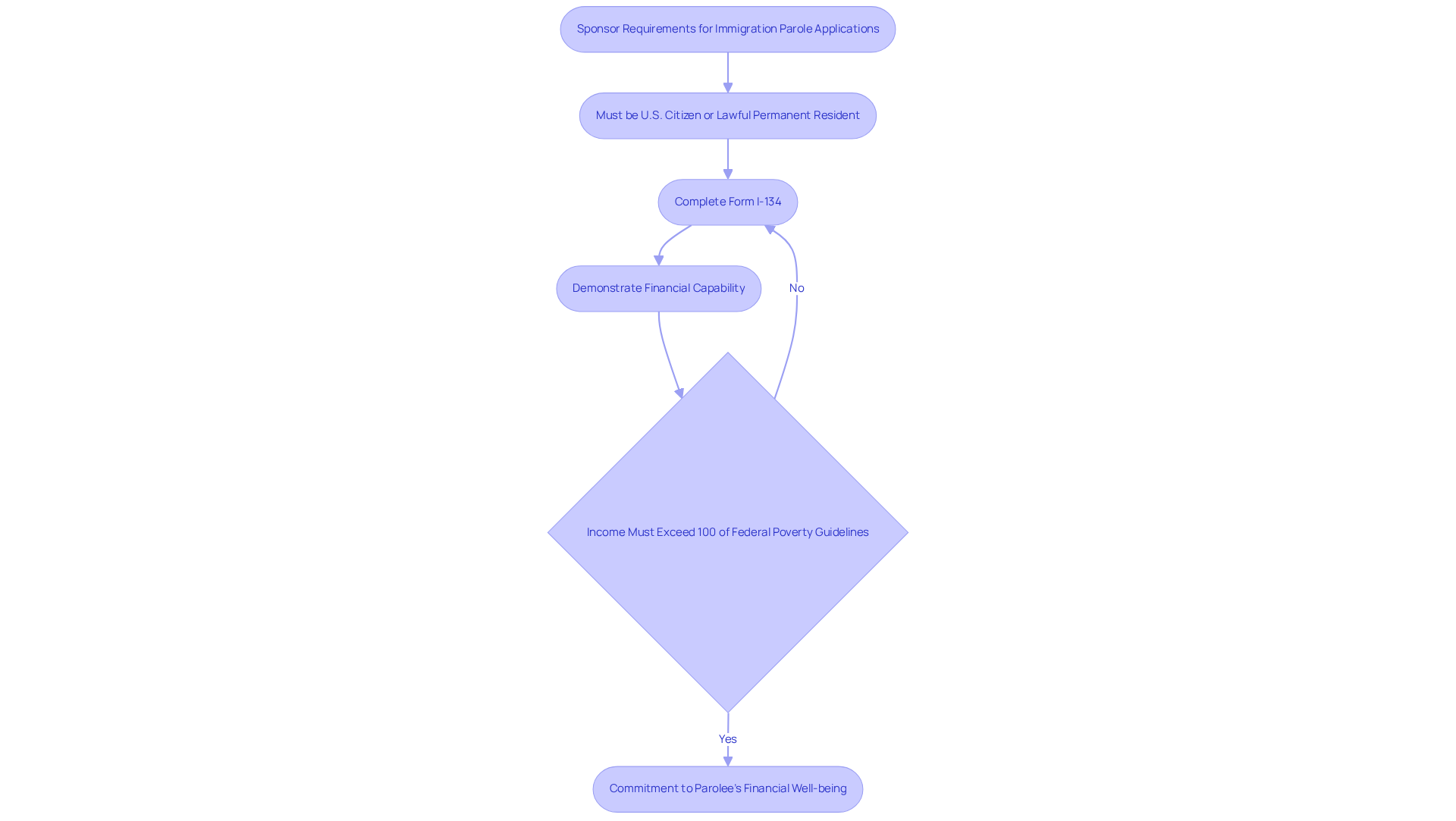
Factors Considered in Immigration Parole Decisions
USCIS evaluates several critical factors when determining immigration parole outcomes, including:
- Urgency of Humanitarian Need: The pressing nature of your situation is paramount. If you can demonstrate critical medical needs or other urgent circumstances, your request will be prioritized.
- Potential Public Benefit: Parole may be granted if it serves significant public interests, such as law enforcement or national security. Participation in legal proceedings can also play a role.
- Applicant's Background: Your immigration history is crucial. A clean record can enhance your chances of approval, while previous violations might hinder the process.
- Supporting Documentation: The strength and completeness of your submitted documentation are vital. Comprehensive evidence supporting your need for early release can significantly influence the decision.
- Sponsor's Financial Capability: Your financial supporter must demonstrate the ability to support you during your stay in the U.S. Insufficient evidence of financial backing can lead to a denial of your parole request.
It’s essential for healthcare professionals to understand their rights during immigration emergencies. If you face situations like ICE enforcement actions or deportation proceedings, remember: you have the right to remain silent and the right to an attorney. Don’t open your door unless ICE has a warrant signed by a judge. Prompt action is crucial; utilize your rights and reach out to Vasquez Law Firm for urgent legal support. Understanding these standards and your entitlements is vital for healthcare professionals navigating the immigration system, as they directly influence the chances of fulfilling the immigration parole requirements for a successful release request. We’re here to fight for your family-reach out to us immediately for support.
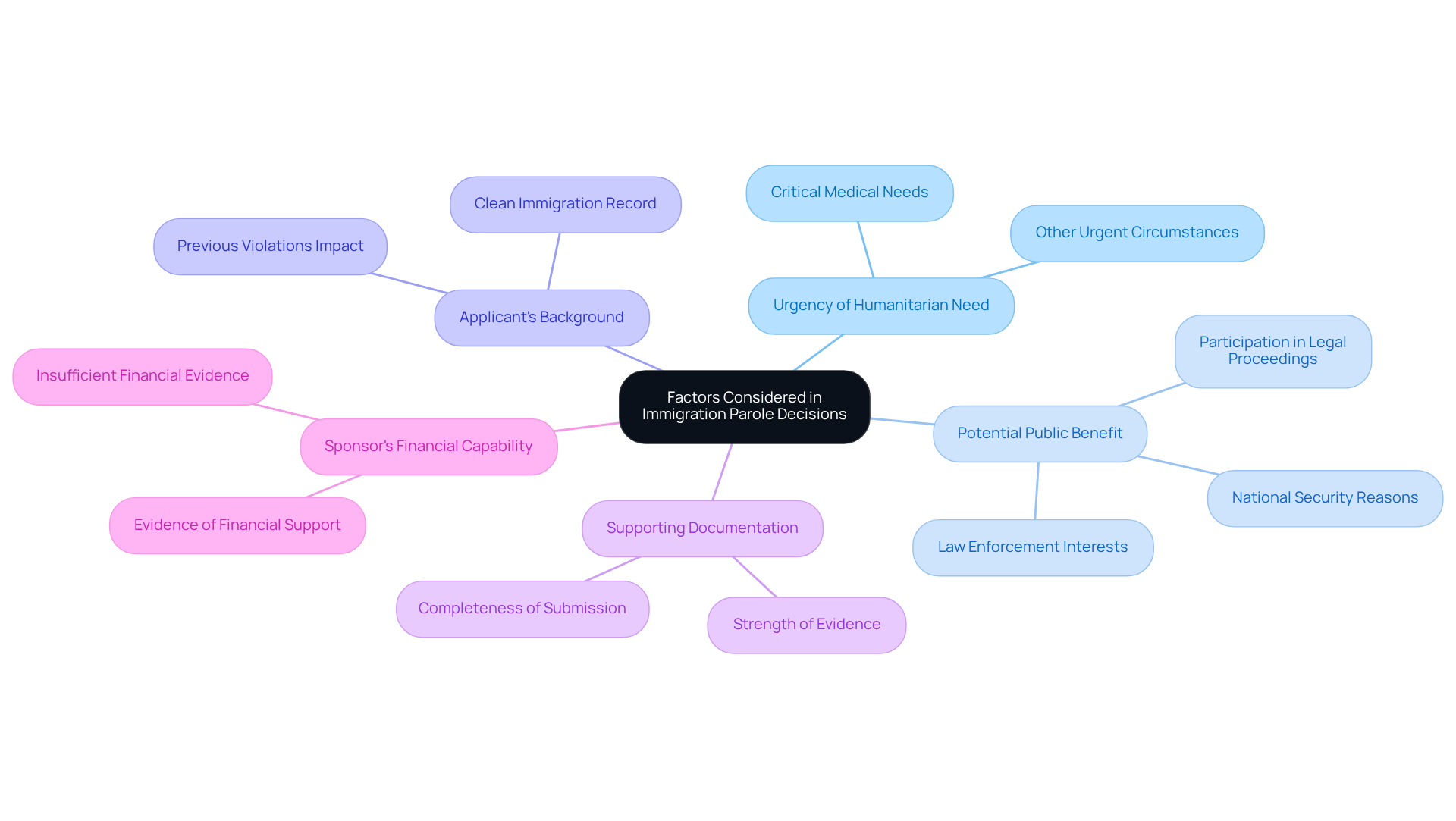
Humanitarian Parole: Special Considerations and Requirements
Humanitarian permission is a temporary measure granted under specific circumstances, primarily for medical emergencies or threats to life. Have you ever felt overwhelmed by the immigration process? To qualify, applicants must present compelling evidence of their situation, which typically includes detailed medical documentation or police reports. Unfortunately, the approval rate for urgent humanitarian visa cases has been significantly low, averaging below 40% in recent years. This highlights the importance of a thoroughly prepared submission.
For those facing medical emergencies, it’s crucial to outline the necessity of treatment that cannot be obtained in their home country. Applicants must:
- Clearly explain their medical condition.
- Provide documentation supporting their diagnosis.
- Detail why they cannot receive necessary treatment elsewhere.
- Include a comprehensive plan for covering treatment costs.
Additionally, financial capability is a key consideration in the approval process.
Expedited processing may be available for cases deemed urgent, but applicants must provide evidence justifying the urgency of their request. This could include documentation of the medical emergency and any attempts made to secure a visa. We understand how overwhelming this feels, and immigration attorneys highlight that careful preparation and effective communication of the urgency can greatly influence the success of humanitarian applications in medical emergencies.
Overall, comprehending these requirements and considerations is essential for healthcare workers navigating the complexities of humanitarian release, particularly in urgent situations. Remember, you’re not alone in this fight; we’re here to support you every step of the way.
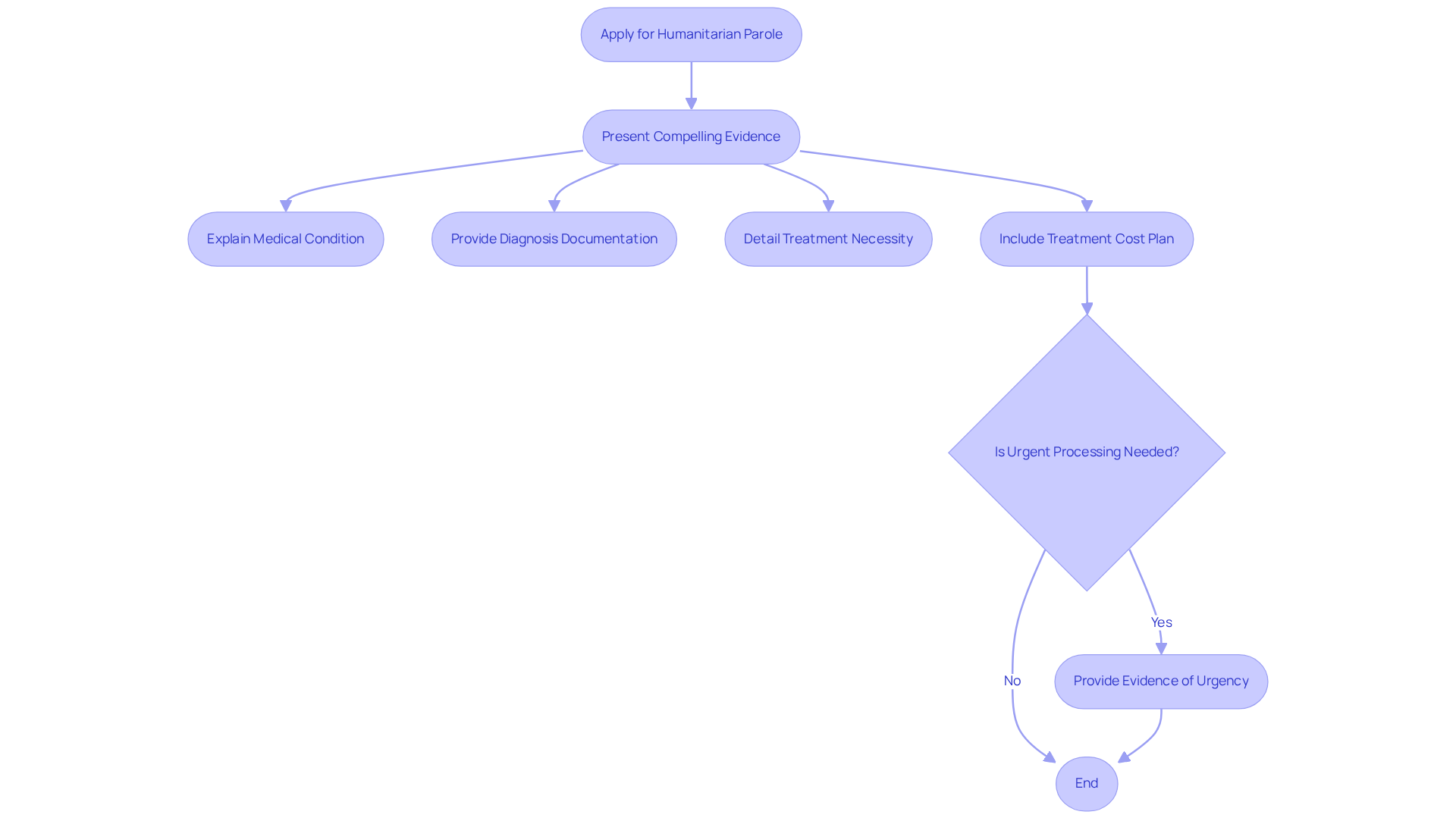
Significant Public Benefit Parole: Eligibility and Process
Significant public benefit release allows individuals to enter the U.S. when their presence serves a public interest, like key witnesses in legal proceedings or those providing essential services. Have you ever felt lost in the immigration process? To qualify, applicants must clearly demonstrate how their entry would benefit the public in accordance with the immigration parole requirements, supported by robust documentation. This may include affidavits from legal authorities or evidence of the critical nature of their services.
The application process for immigration parole requirements involves submitting a request to the Department of Homeland Security (DHS), which evaluates the merits based on the urgency and significance of the claimed public benefit. In recent years, the number of individuals awarded substantial public benefit release has fluctuated, reflecting changes in entry policy and enforcement priorities. For instance, in 2023, the DHS reported a notable increase in approvals, highlighting the growing recognition of the importance of such cases.
At Vasquez Law Firm, our specialists in visa law stress the importance of careful preparation when applying for this kind of release. We understand how overwhelming this feels. We advise applicants to provide comprehensive evidence that supports their claims and adheres to the immigration parole requirements set by evolving standards from immigration authorities. Furthermore, beginning October 16, 2025, a new $1,000 release fee will be necessary, which candidates should be mindful of as they prepare their submissions. Real-world examples demonstrate successful applications, such as those involving healthcare professionals who were able to enter the U.S. to assist in public health emergencies, emphasizing the critical role of significant public benefit programs in addressing urgent societal needs.
We’re here to fight for your family. Our firm offers a range of immigration services, including assistance with green cards, citizenship, and work visas, ensuring that applicants receive comprehensive support throughout their immigration journey. Your future matters to us.
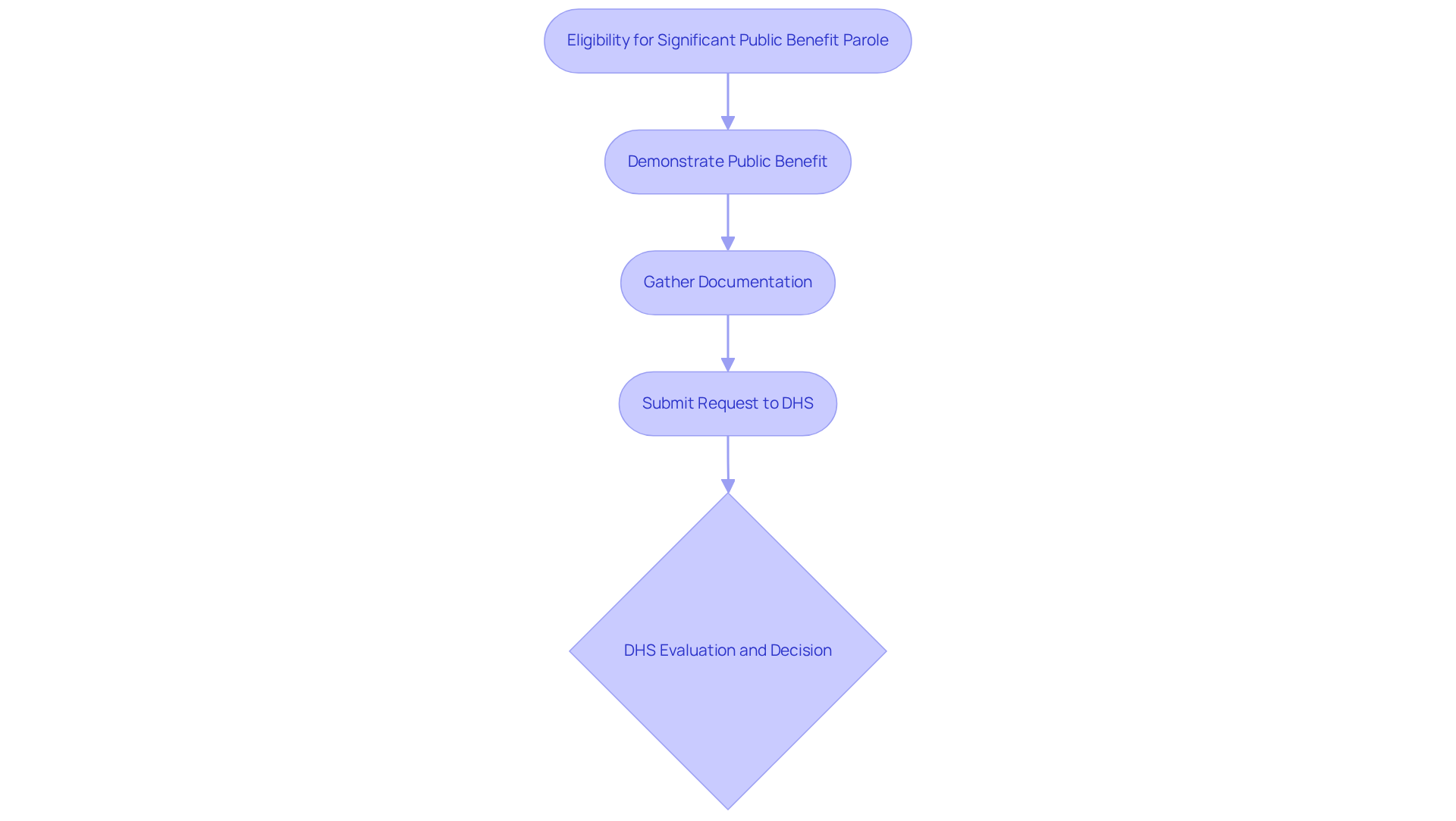
Rights and Responsibilities of Immigration Parolees
Immigration beneficiaries have the right to stay in the U.S. for the duration of their grant and may qualify for work authorization. But remember, you must comply with all U.S. laws and the conditions of your parole. If you receive a subpoena or encounter ICE enforcement actions, it’s crucial to understand your rights: you have the right to remain silent, the right to an attorney, and the right not to sign documents without legal counsel.
DO NOT open your door unless ICE has a warrant signed by a judge. Time is of the essence; if you face a legal emergency, exercise your right to remain silent and request a lawyer immediately. We’re here for you 24/7 for emergency defense. Our emergency line is staffed around the clock for urgent legal matters.
Failing to follow these guidelines can lead to the revocation of your parole and possible deportation. Knowing your rights and acting quickly can significantly affect your legal standing and future in the U.S. Remember, you’re not alone in this fight. We’re here to support you every step of the way.
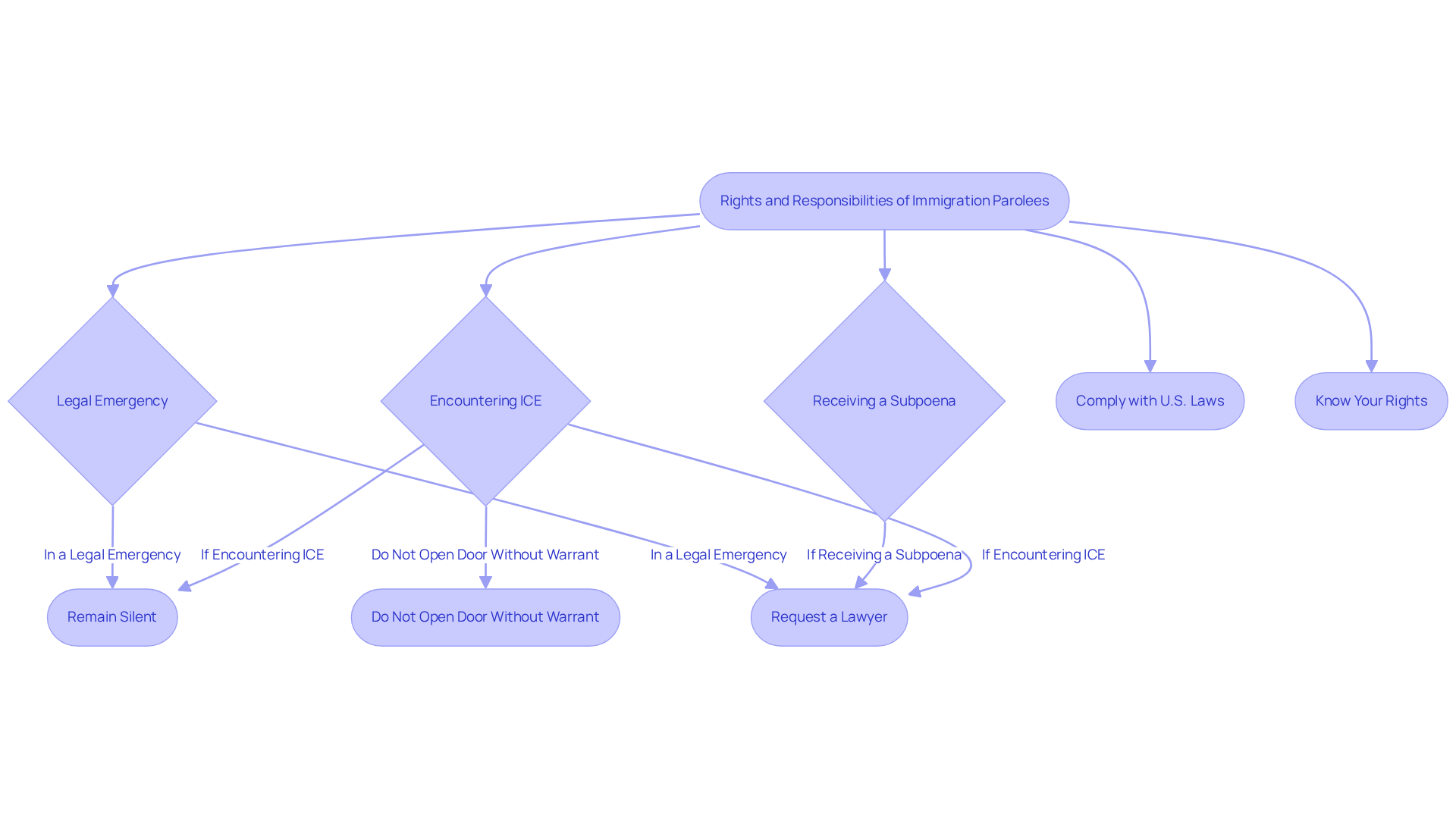
Conclusion
Navigating immigration parole requirements is a crucial journey for healthcare workers eager to lend their skills in the U.S. It’s not just about paperwork; it’s about empowering individuals and recognizing the vital role they play in tackling our nation’s healthcare challenges.
This article highlights essential aspects of immigration parole-eligibility criteria, necessary documentation, and the application process. It stresses the need to demonstrate urgent humanitarian needs or significant public benefit, along with the importance of thorough documentation and legal support. These insights serve as a roadmap for healthcare professionals, ensuring they’re ready to face the complexities of their immigration journey.
Understanding immigration parole requirements is vital. Healthcare workers encounter unique hurdles in their quest for residency, and being informed can truly make a difference. Engaging with expert legal guidance, like that from Vasquez Law Firm, can significantly boost their chances of successful applications. This support allows them to concentrate on their crucial work within the community. Now is the time to take action, seek help, and ensure that the contributions of healthcare professionals are recognized and facilitated within the U.S. system.
Frequently Asked Questions
What is the role of Vasquez Law Firm in assisting healthcare professionals with immigration parole requirements?
Vasquez Law Firm provides expert guidance on residency permit criteria, particularly for healthcare professionals, helping them navigate the complexities of immigration parole requirements to gain entry permission into the U.S.
What is immigration parole, and why is it important?
Immigration parole allows temporary entry or stay in the United States for non-citizens facing urgent humanitarian challenges. It serves as a crucial option for individuals who might otherwise be denied entry.
Who is eligible to apply for immigration parole?
Individuals who demonstrate urgent humanitarian needs or significant public benefit can apply for immigration parole. This includes those facing medical emergencies, victims of violence, or individuals wanting to reunite with family in the U.S., as well as healthcare workers with urgent job opportunities.
What rights do individuals have when facing ICE enforcement actions?
Individuals have the right to remain silent, consult with an attorney, and choose not to sign any documents without legal guidance. They should not open their door to ICE unless there is a warrant signed by a judge.
How does Vasquez Law Firm support clients during emergencies?
Vasquez Law Firm offers free consultations and 24/7 emergency support for individuals facing legal challenges related to immigration, ensuring they have access to immediate assistance.
Why is it crucial for healthcare workers to understand immigration parole requirements?
Understanding immigration parole requirements is essential for healthcare workers to successfully navigate the entry process, allowing them to fill critical roles in the U.S. healthcare system amidst staffing shortages.




